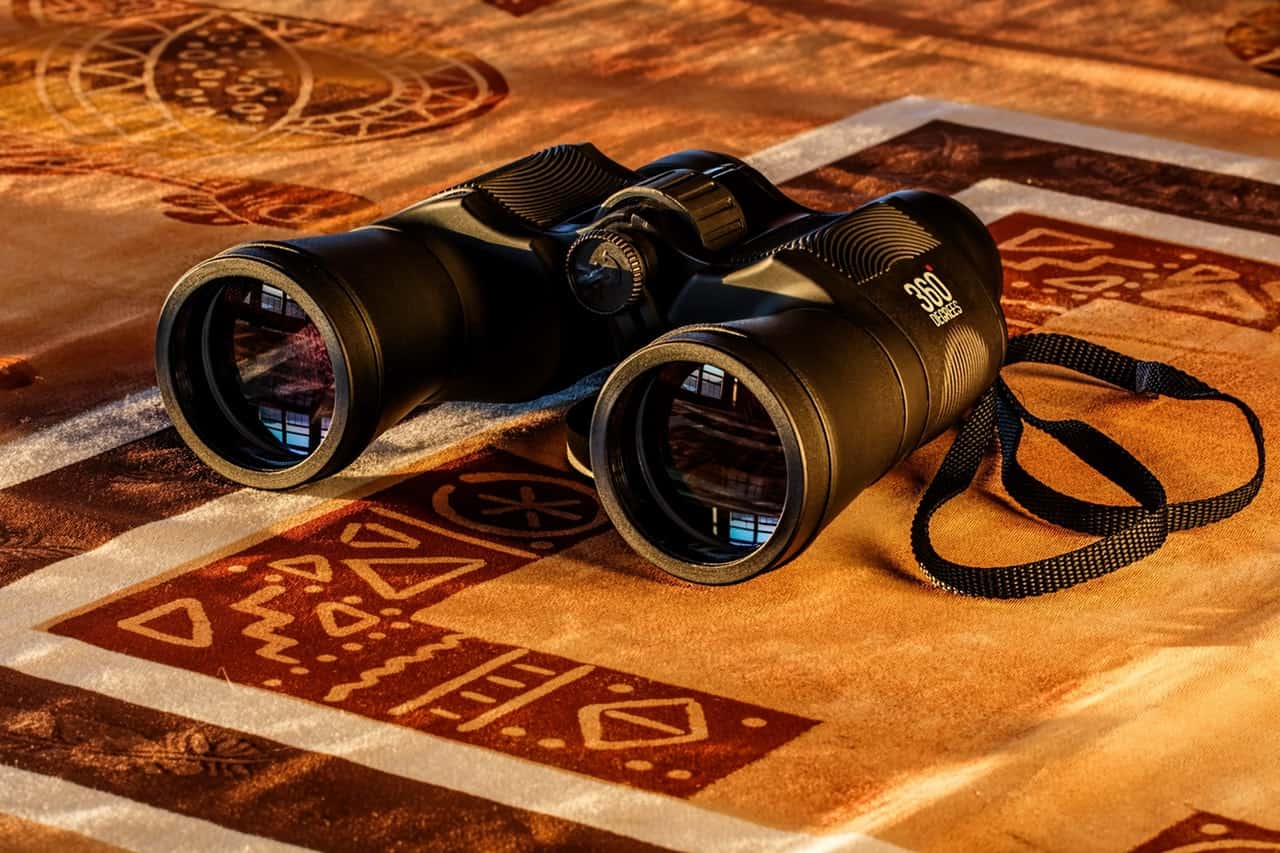Besides patience and silent moves, you need binoculars to watch birds upfront. Binoculars are one of the most common tools birders use to get a better look at the birds they’re trying to identify. While it’s true that some birds may be startled by the sudden appearance of someone holding binoculars, this is usually only temporary.
If you’re concerned about disturbing the birds you’re watching, try to be as unobtrusive as possible. Find a spot where you can sit or stand without being in the direct line of sight of the birds, and avoid making any sudden movements.
Once the birds get used to your presence, they’ll likely return to their normal activities. All the while, you’ll be able to get a better look at them through your binoculars.
But do binoculars scare birds? The simple answer is yes, but sometimes. Binoculars can scare birds sometimes. If you are using them to get a closer look at birds, keep them pointed down so that they are not staring directly into the bird’s eyes.
Also, try to avoid sudden movements and be as quiet as possible. If the bird sees you coming, it may fly away before you can see it up close.
Do Bigger Binoculars Scare Birds?
Yes, bigger binoculars do scare birds. A bird might sit there for ages, but it will fly off as soon as you put up your binoculars. This is because birds have excellent eyesight and can spot predators from a long way away. When they see something large and looming, like a pair of binoculars, they interpret it as a threat and take off.
Most birders use large binoculars to get a better look at the birds they’re observing. The size of the binoculars doesn’t matter to the birds; it’s just the movement that can startle them.
So, if you’re careful and keep your binoculars steady, you shouldn’t have any trouble getting a good look at the birds without scaring them away. This way, they won’t see you as a threat, and you’ll be able to get a good look at them.
Read Also: How do Binoculars work?
What Else Can Scare Birds?
Other things can scare birds, such as reflecting binoculars, loud noises, and bright colours. If you’re wearing brightly coloured clothing, the birds may mistake you for a predator and fly away.
Sudden movements can also scare birds. It’s important to be as still as possible when observing them. If you need to move, do so slowly and smoothly not to startle them.
Just keep them pointed down, so you’re not staring directly into the animal’s eyes. If you do this, you should be able to get a good look at the animal without scaring it away.
Do Binoculars Scare Everything?
Most animals are not scared of binoculars and will pay them little attention. However, some animals may be startled by binoculars, especially if they are not used to seeing them.
Birds are the most likely creatures to be scared off by binoculars, as they are very sensitive to changes in their surroundings. If you are birdwatching, keep your binoculars out of sight until the birds are used to your presence.
Smaller animals such as rodents and rabbits may also be scared of binoculars. Best to use them sparingly around these creatures.
In general, binoculars should not scare any animals. But it is always best to be cautious when using them around creatures that are not used to seeing them.
What Sizes Binoculars Are Good For Bird Watching?
Most birders generally find that binoculars with an objective lens of 42mm or 50mm provide a good balance of weight, portability, and power. But the best binoculars for you are the ones that feel comfortable in your hands and allow you to see the birds you want to see clearly.
Binoculars come in a variety of sizes. The size that is best for bird watching depends on a few factors.
First, consider how far away the birds you want to see are likely to be. If you’re planning to do some serious birding in open country, you’ll need binoculars that can provide good magnification, which means a larger objective lens.
On the other hand, if you’ll mostly be looking at birds in your backyard or nearby parks, you won’t need as much power and can get by with a smaller pair of binoculars.
Next, think about how easy it is for you to hold binoculars steady. Larger binoculars are more difficult to hold steady, so if you have shaky hands or are likely to be birding in low-light conditions, you might consider a smaller pair.
Don’t forget to consider how much weight you’re willing to carry. Binoculars can range from lightweight models that can easily be carried in a pocket to heavy-duty models requiring a tripod. If you are doing a lot of hiking, you’ll probably want to choose a lighter pair of binoculars.
Are Small (Compact) Binoculars Good For Birdwatching?
The main reason why small binoculars are not typically recommended for birdwatching is that they do not offer the same level of magnification and image quality as larger models. This can make it difficult to get a clear view of birds, particularly if they are far away.
In addition, small binoculars tend to be less stable on the eyes than larger ones. This makes them more difficult to keep steady, which can again impact the clarity of the image.
Read Also: Best Binoculars for Bird Watching?
Why Are Bird Watchers Ditching Their Old Binoculars?
If you’re an avid bird watcher, you know that having a good pair of binoculars is essential to getting the best views of your feathered friends. But what happens when your trusty binoculars start to show their age? You might be tempted to buy a new pair, but before you do, consider this: many bird watchers are ditching their old binoculars.
There are a few reasons why bird watchers are making the switch. The traditional, large lensed binoculars scare the bird away. Hence it leads to birders missing the view.
Newer binoculars often have better optics than older models. This means that you’ll be able to see your birds more clearly, and in greater detail.
Traditional binoculars do not offer as clearer a view. Digital binoculars use a process called image stabilization to reduce blurriness. This means that you’ll see birds more clearly, even if they’re in motion.
Second, digital binoculars are much lighter than traditional binoculars. This is because they don’t use heavy lenses and other components. This makes them much easier to carry around, which is ideal if you plan on doing a lot of bird-watching.
Digital binoculars are much more affordable than traditional binoculars. This is because they don’t use as many expensive materials. As a result, you can get a great pair of digital binoculars for a fraction of the cost of a traditional pair.

Binos enthusiast since I was 12 – A real expert in all things optics including rifle scopes and red dots. Live in Dubai & love writing, beaches and eating!






